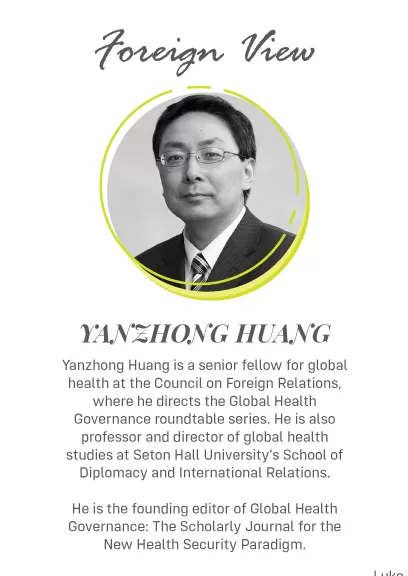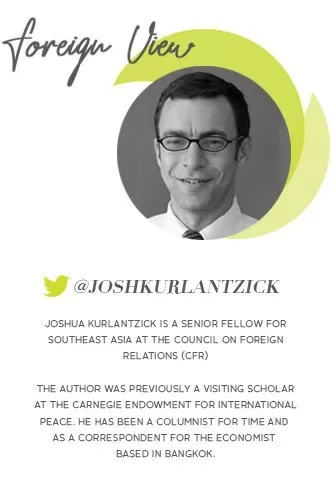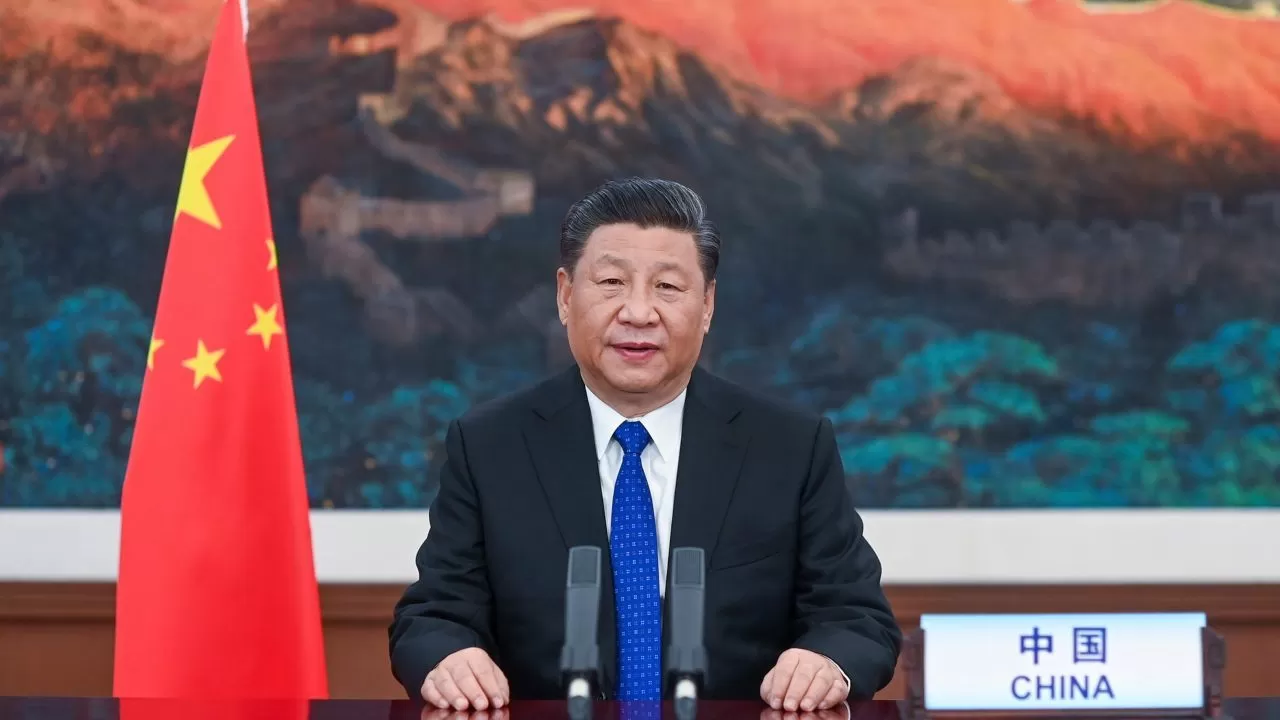 For more than two millennia, Chinese leaders saw their country as one of the dominant actors in the world. The concept of zhongguo—the Middle Kingdom, as China calls itself—is not simply geographic. It implies that China is the cultural, political, and economic center of the world. This Sino-centrist worldview has in many ways shaped China’s outlook on global governance—the rules, norms, and institutions that regulate international cooperation. The decline and collapse of imperial China in the 1800s and early 1900s, however, diminished Chinese influence on the global stage for more than a century.
For more than two millennia, Chinese leaders saw their country as one of the dominant actors in the world. The concept of zhongguo—the Middle Kingdom, as China calls itself—is not simply geographic. It implies that China is the cultural, political, and economic center of the world. This Sino-centrist worldview has in many ways shaped China’s outlook on global governance—the rules, norms, and institutions that regulate international cooperation. The decline and collapse of imperial China in the 1800s and early 1900s, however, diminished Chinese influence on the global stage for more than a century.
In the past two decades, China has reemerged as a major power, with world’s second largest economy and a world-class military. It increasingly asserts itself, seeking to regain its centrality in international system and over global governance institutions.
 These institutions, created mostly by Western powers after World War II, include the World Bank, which provides loans and grants to developing states; the International Monetary Fund, which works to secure the stability of the global monetary system; and the United Nations, among others. President Xi Jinping, the most powerful Chinese leader since Mao Zedong, has called for China to “lead the reform of the global governance system,” transforming institutions and norms in ways that will reflect Beijing’s values and priorities.
These institutions, created mostly by Western powers after World War II, include the World Bank, which provides loans and grants to developing states; the International Monetary Fund, which works to secure the stability of the global monetary system; and the United Nations, among others. President Xi Jinping, the most powerful Chinese leader since Mao Zedong, has called for China to “lead the reform of the global governance system,” transforming institutions and norms in ways that will reflect Beijing’s values and priorities.
China is pursuing a multipronged strategy toward global governance. It supports international institutions and agreements aligned with its goals and norms, such as the World Bank and the Paris Agreement on climate change. Yet, on issues in which Beijing diverges from the norms of the current system, such as human rights, it seeks to undermine those values and create alternative institutions and models. In areas where norms and institutions are still being established, such as internet governance, China works with other authoritarian powers such as Russia to create standards that reflect their interests.
China has become a powerful force in global governance. Increasingly, its efforts appear to be deepening divides with other countries, particularly democracies that are committed to existing norms and institutions. Ultimately, this divide could make it harder for states to collaboratively address major international challenges. The divide could even create two distinct systems of global governance, badly undermining multilateral cooperation.
STAGE 1: Imperial China (Third Century BCE to 1900s)
For over two thousand years, beginning with the Qin dynasty (221–206 BCE) and ending with the collapse of the Qing (1644–1911 CE), imperial Chinese leaders perceived themselves as rulers of the world, even though Beijing had never built a global empire. Even when China’s influence collapsed in the nineteenth and twentieth centuries, Chinese leaders dreamed of regaining global influence.
Imperial China’s Views on International Order
Imperial Chinese leaders did not think of global governance as it is defined today but maintained views on regional order. Chinese emperors made territories and kingdoms in the imperial orbit dispatch envoys to perform ritualistic submissions. This regional order was a predecessor of global governance.
The Collapse of Imperial China
Until the 1840s, China remained a major power. But China’s regional dominance was destroyed in the late 1800s and early 1900s as Britain defeated it in the Opium Wars and as other major powers carved out territories in the country. The last dynasty collapsed in 1911.
Aspirations to Power
Despite defeat, China’s leaders maintained the idea that one day the country would again be the center of the world. Sun Yat-sen, known as the father of modern China, was one of the first to advocate for “revitalizing the Chinese nation”. But the Republic of China (founded in 1912) was a weak state, unable to play a role in global governance. A long civil war in the 1930s and 1940s between Communist and Nationalist forces weakened China further.
STAGE 2: Revolutionary China (1949–1976)
At the end of World War II, China became an initial member of the United Nations and seemed poised to play a larger role in the new international order. But after the Communist Party won the civil war and took power in 1949, China rejected the international system and tried to help create an alternative global governance order.
Mao Challenges Global Institutions
Frustrated with the existing international system—the Republic of China (Taiwan) remained seated on the UN Security Council, instead of the People’s Republic of China—Beijing promoted alternative values and institutions. In 1953, Premier Zhou Enlai enunciated “The Five Principles of Peaceful Coexistence”—mutual respect for sovereignty and territorial integrity, mutual nonaggression, noninterference in each other’s internal affairs, equality and mutual benefit, and peaceful coexistence. Endorsed by leaders of many newly independent former colonies, these principles formed a basis for the nonaligned movement (NAM) of the 1960s. NAM became a counterweight to Western-dominated global governance.
China Supports a More Radical Approach
By the 1960s, Beijing tried more directly to subvert the existing international order, often by exporting revolution. China trained and armed antigovernment guerrilla forces in Africa, Latin America, and Southeast Asia.
China Returns to the International System
China returned to the international system in the early 1970s and rebuilt its ties with the United States. In the 1970s, it accepted a weaker international role and sought to participate in the institutions and rules set up after World War II. In October 1971, the UN General Assembly voted to admit the People’s Republic of China as a member and as one of the five permanent members of the Security Council.
STAGE 3: Reforming China (1977–2000)
After the end of the Mao era, China opened up in the 1980s and 1990s, reformed its economy, and increased its role in global governance, including by cooperating with international institutions. During this time, China adapted many domestic laws to conform to those of other countries.
After Mao’s Death, China Rejoins the World
Following Mao’s death in 1976, China rejoined many international organizations but remained a weak actor in global governance. By 1977, China belonged to twenty-one international organizations, but few Chinese nationals held senior positions in them.
Deng Focuses on China’s Economy
Deng Xiaoping, who ultimately succeeded Mao, oversaw major economic reforms in the late 1970s and early 1980s, which launched China’s growth and ultimately increased its global reach. Deng introduced market reforms and encouraged inflows of foreign capital and technology, among other steps. During this period, China also joined more global financial and trade institutions, including the International Monetary Fund, the World Intellectual Property Organization, and the Asian Development Bank.
After Tiananmen, China Boosts Its Global Governance Integration
In 1989, the Chinese government violently cracked down on democracy protestors in Beijing’s Tiananmen Square and elsewhere in the country, which resulted in widespread international condemnation. To help rebuild its reputation and ties with other countries, beginning in the early 1990s Beijing increasingly embraced multilateralism and integration with global governance institutions. Beijing signed multilateral agreements it had previously been reluctant to join. It acceded to the Nuclear Nonproliferation Treaty in 1992, signed the Comprehensive Nuclear Test Ban Treaty in 1996, and signed the International Covenant on Civil and Political Rights in 1998.
STAGE 4: Resurgent China (2001–2012)
In the first decade of the twenty-first century, China often proved willing to play by international rules and norms. As its economy grew, however, Beijing assumed a more active role in global governance, signaling its potential to lead and to challenge existing institutions and norms. The country boosted its power in four ways: it took on a bigger role in international institutions, advertised its increasing influence, laid the groundwork to create some of its own organizations, and sometimes subverted global governance rules.
China Increases Its Role in International Organizations
In 2010, China surpassed Japan to become the world’s second biggest economy and earned the third greatest percentage of votes in the World Bank and the International Monetary Fund. Meanwhile, Chinese nationals ascended to senior positions in international organizations. In 2006, Margaret Chan was appointed director general of the World Health Organization (WHO). In office, she maintained several of Beijing’s goals, including supporting its plan to promote traditional Chinese medicine.
China Advertises Its Economic Influence
During the financial crisis of 2007–2008, Beijing participated in efforts to coordinate macroeconomic responses. Before attending the 2008 summit of the Group of Twenty, China echoed the United States’ call for a large, coordinated fiscal stimulus. At home, Beijing introduced a $580 billion stimulus plan for its economy. Beijing then used state media and other tools to advertise to other countries China’s role in helping the recovery of the world economy.
China Creates Its Own Multilateral Organizations
China also started to create its own Beijing-dominated institutions, a process that would expand in the 2010s. In the previous decade, Beijing had established the Shanghai Cooperation Organization (SCO), which built on the earlier Shanghai 5 group and brought together China, Russia, and Central Asian states. In the 2010s, the SCO would become a vehicle for China to challenge existing global norms, such as pushing its idea of closed internets controlled by governments, rather than one global, open internet.
The United States Believes China Will Be a Responsible Power
Under Presidents George W. Bush and Barack Obama, Washington generally accepted that Beijing would increasingly support global governance norms and institutions. In 2005, U.S. Deputy Secretary of State Robert Zoellick publicly urged China to become a “responsible stakeholder” in the international system. The Donald J. Trump administration, by contrast, has expressed greater concern over Chinese efforts to subvert existing norms and has pushed back against Beijing’s efforts to use international institutions to promote Chinese foreign policies and programs like the Belt and Road Initiative.
China Challenges International Norms and Rules
Under Jiang Zemin’s successor Hu Jintao, China more openly challenged international norms. Beijing asserted that its sovereignty over disputed areas of the South China Sea was a “core interest,” and “nonnegotiable,” despite participating in negotiations with other claimants. Beijing also expanded its footprint in the South China Sea: it built military facilities on disputed islands and artificial features. And it expanded its aid around the world.
STAGE 5: Center Stage (2012–present)
Since the early 2010s, as China’s economic and military power has grown, so too has its ambition and capability to reform the global governance system to reflect Beijing’s priorities and values.
Promoting Chinese Priorities and the China Model
Some of the priorities Beijing promotes in global governance are defensive in nature, and reflect long-standing Chinese aims: preventing criticism of China’s human rights practices, keeping Taiwan from assuming an independent role in international institutions, and protecting Beijing from compromises to its sovereignty. Yet China also now seeks to shape the global governance system more offensively, to advance its model of political and economic development. This development model reflects extensive state control over politics and society, and a mix of both market-based practices and statism in core sectors of the economy.
Promoting More Multipolar Global Governance
Xi Jinping has called for more shared control of global governance. He has declared that China needs to “lead the reform of the global governance system with the concepts of fairness and justice.” The terms fairness and justice signal a call for a more multipolar world, one potentially with a smaller U.S. role in setting international rules. The Donald J. Trump administration’s retreat from global leadership has added to China’s opportunity to fill the void and promote multipolar global governance.
Pushing for a Bigger Role in International Agencies
China has gained clout in international organizations traditionally dominated by Western countries. In June 2019, for instance, Qu Dongyu, Chinese vice minister of agriculture and rural affairs, easily defeated the U.S.-backed candidate to become director general of the UN Food and Agriculture Organization. Today, Chinese officials lead four of the fifteen UN specialized agencies.
Creating Alternative Institutions
Beijing also is building its own, China-centered institutions. In 2013, Beijing launched the Belt and Road Initiative, a vast plan to use Chinese assistance to fund infrastructure in, and boost ties with, other countries. Beijing’s more proactive global strategy serves the Xi administration’s dream of returning China to its past glory.
Looking Ahead
China’s evolving global governance strategy is most apparent in four major issues: global health, internet governance, climate change, and development finance.
Global Health
In important respects, China is leading on global health governance at a critical time. Dangerous pathogens like the novel coronavirus are emerging globally and noncommunicable diseases are becoming more prevalent. Many poorer states do not have the funds to address serious health challenges. China is increasingly stepping in to fill that void. It cooperates with the World Health Organization (WHO) and other groups and in the past decade has increased health-related aid to developing states. China is leading the global effort to eradicate malaria in eastern Africa. During the Ebola epidemic in western Africa in 2014, China launched its largest response ever to an international humanitarian crisis, contributing $123 million.
Yet China also is pushing health governance in different, revisionist directions—directions that could undermine global public health cooperation. Beijing often acts unilaterally and hands out aid opaquely, a different approach from that of traditional donors like the United States. Instead of announcing aid initiatives and then publishing formal requests for proposals, China asks potential recipients to approach it for support, often without soliciting formal proposals. China’s approach also emphasizes infrastructure, such as hospitals, yet does little to promote transparency in recipient countries.
Beijing’s reactions to the coronavirus disease (COVID-19) outbreak reflect this approach to global health governance. It acted opaquely at first, covering up the scale of the crisis, then used strict quarantine measures to control the domestic outbreak. It has promoted its model for battling COVID-19 and offered assistance to countries including Iran, Italy, and Spain. With the United States struggling with its outbreak, China’s approach—and aid—has won it plaudits from the WHO and some other states. But many countries are still furious at China for its lack of transparency during the beginning of the outbreak and the quality flaws in some of its aid provided. Moreover, it remains unclear whether China’s assistance and promotion of its COVID-19 model will address other states’ concerns about how Beijing initially addressed the virus.
Internet Governance
China seeks to become a leader in global internet governance and to promote the idea of “cyber sovereignty”—that a state should exert control over the internet within its borders. In October 2017, Xi Jinping unveiled his plans to make China a “cyber superpower.” The country already boasts the most internet users in the world. Chinese companies are also leading the race in patents and standards for the fifth generation of wireless communication standards (5G). Globally, Beijing promotes its domestic cyber sovereignty approach to internet governance, which hinges on Communist Party control and censorship. Xi’s administration uses increasingly advanced technology to dominate the domestic internet and social media, blocking global search engines and social media sites and promoting domestic versions.
China’s domestic internet offers an alternative to existing, freer models of internet governance, and Beijing also uses its influence at the United Nations and other forums to push countries to adopt more closed internets. Meanwhile, Chinese corporations such as Huawei and CloudWalk have supplied repressive governments in Venezuela and Zimbabwe with surveillance tools like facial recognition technology. And the Belt and Road Initiative (BRI) contains a “Digital Silk Road” initiative that includes inviting foreign officials to participate in workshops on information technology policy, including controlling the internet.
Climate Change
In the past decade, China has shifted from resisting international cooperation on climate change to supporting such cooperation. For years, Beijing had been skeptical of multilateral approaches to climate change, worrying they could slow China’s growth. China allied with Brazil and India in blocking a potential multilateral agreement to address climate change in 2009. China’s breakneck economic growth and heavy reliance on coal have helped make it the world’s largest emitter of carbon dioxide.
Yet at home, Beijing has begun to adopt measures to combat emissions, in part to address its own significant air pollution. China has reduced the role of fossil fuels in its energy mix and become the world’s biggest investor in renewable energy.
China’s activism at home has been matched by new activism on the global stage, where it has worked with existing international institutions and has been a leader on climate change. In 2015, the United States partnered with China to call for a strong, legally binding treaty that ultimately became the Paris Agreement. Now Beijing is trying to save the agreement as others, including the United States, retreat. Still, international observers have criticized China for continuing to export coal-fired power plants through the BRI, even as it has reduced their usage at home.
Development Finance
China has pursued both unilateral and multilateral approaches to development finance. The world faces a sizable gap in financing for infrastructure. In response, China has established two new institutions. In one case, Beijing operates according to its own standards; in the other, it has adopted international aid standards.
China launched the BRI in 2013. The initiative—a vision to deepen physical infrastructure, financial, political, and security ties spanning Africa, Asia, Europe, and the Middle East—has placed Beijing in a position to shape global norms and rules on aid, infrastructure, and logistics. Under the initiative, China has announced over $460 billion in lending to BRI projects. But BRI lending practices do not align with those of other international banks and donor countries. Some foreign leaders and civil society groups have criticized BRI practices for lacking transparency, failing to uphold environmental and safety standards, and leading recipient states to incur high levels of debt.
But besides the BRI, China in 2015 also launched the Asian Infrastructure Investment Bank (AIIB). AIIB is a multilateral financial institution that invests in infrastructure projects and other productive sectors across Eurasia. Unlike the BRI, the AIIB generally follows international lending standards and often cooperates with the World Bank and Asian Development Bank to fund projects.
The Future
Over the last two decades, China has regained much of its influence in the world, as Beijing is making progress toward its dream of restoring what it sees as its rightful great power status. Beijing has built up its influence over global governance in particular, gaining a greater say within important organizations while also launching new initiatives like the Belt and Road Initiative. China’s increased involvement in global governance expands its international political clout, helps it project soft power, and also promotes its domestic economic development.
In the future, if its economy continues to grow over the long term, China will more forcefully set the terms for global governance. It will wield greater power within long-standing organizations like the World Bank and United Nations and also will strengthen new, China-dominated institutions.
Beijing’s more assertive approach could enhance the international system. China could shoulder greater international responsibilities and prod global governance institutions to better represent the needs of emerging powers. It could facilitate international solutions on climate change in particular. And Beijing has shown, with the Asian Infrastructure Investment Bank, that it can launch an institution that works within existing global governance norms.
But China’s increasingly assertive presence could prove divisive, especially in areas like development finance, where Beijing’s approach could marginalize existing institutions. Such divisions could paralyze collaboration in critical realms of global governance. And while in some areas, such as climate change, China does not try to impose its own visions and models, in areas of human rights and internet governance, Beijing tries to promote its own, more authoritarian norms. In May 2020, Beijing passed new legislation giving China extensive powers to crush dissent in Hong Kong, seriously threatening the special administrative region’s autonomy. If China (and Russia) can set the standards for internet governance, for instance, they could pave the way for other countries to embrace cyber sovereignty, sparking a divided world with two internets—one generally open and the other closed and favored by autocracies.
*******
(This article was originally written and published in CFR, and was republished with the permission of the authors)
“Disclaimer: The author takes full responsibility on the content of this opinion”.



